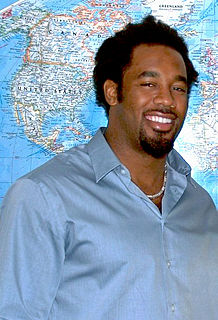A Quote by Dan Gillmor
In a participatory culture, none of us is fully literate unless we're creating, not just consuming.
Related Quotes
Many books condemn 'secular' culture, just as many books advocate (consciously or unconsciously) accommodating ourselves to culture. Brett has written something much different: a biblically informed and culturally savvy approach to consuming culture in a God-honoring, community-building, and mission-advancing way.
I watch reality TV, but unless you have been part of that crew, unless you've sort of been immersed in that culture in what's happening, unless you have been in that concentrated moment, you wont believe it unless you're there. And with 'Ton of Cash' we just hope that we captured all of the best moments.
I watch reality TV , but unless you have been part of that crew, unless you've sort of been immersed in that culture in what's happening, unless you have been in that concentrated moment, you wont believe it unless you're there. And with 'Ton of Cash' we just hope that we captured all of the best moments.
For my parents' generation, the idea was not that marriage was about some kind of idealized, romantic love; it was a partnership. It's about creating family; it's about creating offspring. Indian culture is essentially much more of a 'we' culture. It's a communal culture where you do what's best for the community - you procreate.
I think history is only ever invisible when it abets your sense of self, your desires, your ambitions, when it carries your life along in a kind of frictionless way. History is never invisible, finally, though some people seem to work very hard to be willfully blind. That's too harsh, or too self-righteous: none of us sees history fully; none of us is adequately aware of how the arrangements of the present moment foreclose the possibilities of others to fully live their only lives.
Motion pictures are just beginning to live up to their true potential of being immersive experience - going from beyond black and white flickering images to fully immersive 3D color high-definition. You don't even know where the real world starts and the fake world begins. And yet, none of that's going to matter unless the story and the emotions that they allow us to become invested in are something that we can recognize. Pixar is able to do this in ways that almost defies speculation.
From American Idol to The Matrix participatory media - where old and new media converge by involving fans - is influencing our culture by creating new forms of interactive storytelling. Yet by enabling people to participate in such various media they can converge as a crowd to alter the story to create new modes of engagement, some not necessarily endorsed by the creator - or the brands that back them.




































